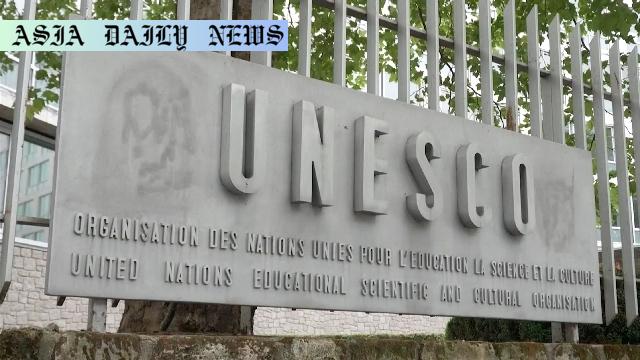UNESCO: US withdrawal raises concerns over divisive cultural issues and foreign policy alignments.
The US announced its withdrawal from UNESCO, citing divisive ideals.
US State Department criticizes UNESCO on cultural issues and Palestine’s membership.
The decision reflects foreign policy priorities and aligns with past actions under President Trump’s first term.

The US Withdraws from UNESCO
The United States has once again announced its withdrawal from the United Nations Educational, Scientific and Cultural Organization (UNESCO). This decision comes after the State Department criticized UNESCO for aligning with what it described as ‘divisive social and cultural causes.’ This move highlights tensions between U.S. foreign policy decisions and the organization’s approach to global cultural cooperation, particularly concerning issues that challenge the ‘America First’ policy platform.
UNESCO has long championed initiatives aimed at promoting global educational, scientific, and cultural development. These include projects to preserve world heritage sites and foster access to education in disadvantaged areas. However, the United States has expressed dissatisfaction with UNESCO’s stance on certain geopolitical issues—most notably, its recognition of Palestine as a member state. This was a matter of significant contention during former President Donald Trump’s administration and resurfaced as one of the key reasons cited for the withdrawal.
The latest withdrawal continues a trend of diminished U.S. involvement in international organizations, a hallmark of the broader America First doctrine. Critics argue this isolates the United States from multilateral decision-making processes, while administration officials defend the move as necessary for safeguarding national interests. From the preservation of global heritage to fostering international collaboration, the U.S.’ decision raises important questions about the future of multilateralism.
Historical Context of US-UNESCO Relations
The U.S. has a complicated history with UNESCO. Initially a founding member, it has withdrawn and subsequently rejoined the organization multiple times. A key turning point occurred in 1984 when President Ronald Reagan’s administration pulled out, citing financial mismanagement and anti-Western sentiment within the organization. The U.S. returned two decades later in 2003 under President George W. Bush after some of these concerns were addressed.
However, the 2011 decision by UNESCO to admit Palestine as a full member reignited disagreements. The United States cut funding to the organization in response, as regulations prohibited the government from funding U.N. bodies recognizing Palestinian statehood ahead of direct negotiations with Israel. By 2019, the Trump administration formalized the U.S. withdrawal citing a ‘need to reform’ and longstanding concerns about the organization’s ‘anti-Israel bias.’
Fast forward to 2023, and these unresolved issues continue to shape the U.S.-UNESCO relationship. While UNESCO argues that its goals focus on cultural diplomacy and global unity, critics in the United States view the organization as increasingly politicized. These opposing perspectives reveal a fundamental tension over the role and purpose of international organizations in today’s geopolitical landscape.
Implications of the US Decision
The withdrawal of the U.S. from UNESCO has sparked debate over its potential impact on global cooperation and cultural diplomacy. The United States, as one of the largest financial contributors to UNESCO, holds significant influence. Its absence creates a vacuum that other leading nations may seek to fill. However, critics argue that this also reduces U.S. influence over key international decisions in education, science, and culture.
For UNESCO, the challenge lies in maintaining its mandate while addressing criticisms of political bias and inefficiency. The loss of U.S. funding could limit the scope of its programs, particularly those aimed at protecting cultural heritage and increasing global access to education. Several member states have expressed concern over the consequences of a fragmented international community at a time when global challenges require unified responses.
Domestically, the decision has drawn mixed reactions. Supporters of the withdrawal argue that U.S. funds are better utilized elsewhere, particularly on pressing domestic needs. Opponents caution that retreating from multilateral organizations diminishes the nation’s ability to shape international norms and values. This discussion underscores the broader debate about the balance between nationalism and globalism in U.S. foreign policy.



Commentary
Analyzing the US Decision to Leave UNESCO
The announcement of the U.S. withdrawal from UNESCO has unsurprisingly stirred global conversations, reigniting debates about the role and relevance of international organizations in modern geopolitics. The decision reflects broader shifts in U.S. foreign policy that prioritize domestic interests and challenge the value of multilateral engagement. While this approach resonates with certain segments of the American population, it raises critical questions about international leadership and collaboration.
UNESCO has historically been a platform for countries to champion educational, scientific, and cultural advancements on a united global stage. The U.S., by stepping away, risks sidelining itself from these efforts and ceding its influence to other nations eager to shape cultural and educational policies. In a time where global challenges like climate change and technological inequality demand concerted action, the absence of one of the world’s largest economies from such discussions is notable and concerning.
The repeated withdrawals of the U.S. from international organizations, UNESCO particularly, also raise troubling questions about the effectiveness and sustainability of these bodies. Criticisms of inefficiency, politicization, and lack of tangible results must be addressed to restore confidence and ensure broader participation. For UNESCO, this moment serves as an opportunity for self-reflection and a chance to strengthen its role as a truly inclusive and impactful global entity.
Ultimately, the U.S. withdrawal reflects a broader ideological struggle about the balance between national sovereignty and global responsibility. As the world becomes increasingly interconnected, finding that balance remains a key challenge not only for the United States but for all members of the international community. This decision, while emblematic of current U.S. priorities, should spark deeper conversations about improving multilateral cooperation in an ever-changing world.